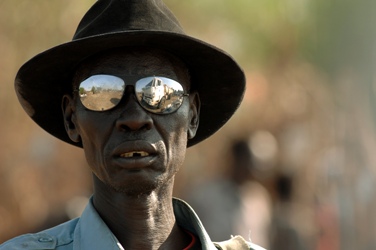Murle leaders describe Pibor attack as ethnic cleansing
January 4, 2012 (JUBA) – Senior members of the Murle community have told the Sudan Tribune that the Luo-Nuer assault on Pibor county over the last two weeks was intended to wipe out and ethnically cleanse their community.

Rather than reclaiming stolen cattle or abducted people, the former commissioner of Pibor County, Akot Mzee, told the Sudan Tribune that the Lou-Nuer’s intention was to eliminate the Murle.
Mzee pointed to a group calling itself the Nuer Youth White Army, which issued a statement on 26 December vowing to “wipe out the entire Murle tribe… as the only solution to guarantee long-term security of Nuer cattle”.
Since June 2011 over 1,000 have been killed in fighting between the cattle herding tribes. In August around 700 were killed and 180 abducted in a Murle raid, the Luo-Nuer say.
According to the Luo-Nuer, the governments failure to protect them and disarm the Murle has forced them to act. The assault on Pibor has left a trail of destruction across the county.
“There is nothing left. What left are vultures eating the dead. They are all out in the whole area hunting civilians and setting houses on fire”, Mzee told the Sudan Tribune on Wednesday.
The South Sudanese government say that after a massive deployment of extra soldiers and troops the Luo-Nuer have begun returning to their territory.
John Boloch Kumen, an official in the government’s Peace and Reconciliation Commission, told the Sudan Tribune that the attack was an act of “ethnic cleansing”.
As one the first few individuals to visit the village of Linkwangole, as part of an advanced official government assessment team, Kumen says he witnessed first hand how badly Pibor county has been affected by the conflict.
“No single structure is left. All houses have been set on fire. Nothing is standing. The whole area has been reduced to ashes. I have never seen such destruction even at the time when the south was fighting Khartoum. There has never been such destruction.”
South Sudan became independent in July as part of a peace deal ending decades of conflict with the north.
The senior Murle official claimed that in Linkwangole he had seen the bodies of seven women burnt in their homes. Two churches, a school and a health centre were set on fire, he said.
Barnaba Marial Benjamin, South Sudan’s minister of information on Wednesday said that government forces were in control of Pibor town and had ordered the immediate withdrawal of the Lou-Nuer to their territories.
“As I am talking to you, Pibor is under the full control of the SPLA [Sudan People’s Liberation Army]. The Lou-Nuer youth members have been ordered to return to their homes, and they are responding. They are now leaving the area.”
He dismissed claims that the new country is moving towards resembling Somalia, where inter-clan violence and insurgencies has prevented the Horn of Africa country from having a functioning government for over two decades.
“Those are just emotional statements. South Sudan is not, and will not become, some kind of Somalia. The government is exerting effort to bring conflict under control”, he said.
South Sudan has drawn criticism for offering to send troops to the African Union force in Somalia, while it is struggling to cope with rebellions, cattle raids and ethnic violence of its own.
When the 6,000 Luo-Nuer youth attacked Pibor town the UN and SPLA were reported to only have a few hundred troops in the area. Jonglei’s governor explained this by pointing out that most battalions had been stationed along the tense border with north Sudan.
Members of the Murle gathered outside South Sudan’s parliament on Wednesday to protest against the failure of the government to protect their community.
Joshua Tamburum, a Murle youth activist who had just returned from Australia, told journalists on Wednesday outside the National Legislative Assembly that there was a “conspiracy” against his ethnic community.
“What is happening now is a clear genocide by all definitions,” he said.
Another member of the Murle community, Samuel Konyi, said that any wrongs the Luo-Nuer felt had been committed against them could not be corrected by another wrong.
“Neither Murle nor Lou-Nuer or any other tribe in Jonglei can be allowed to test how powerful they are”, he said.
Both men said they were attending South Sudan’s parliament to understand why MPs had been so silent on the issue.
Konyi, who was part of an assessment team that visited Pibor on Tuesday said that the attacks were a “clear act of genocide”. Whole areas of Pibor had been reduced to ashes he said.
(ST)
